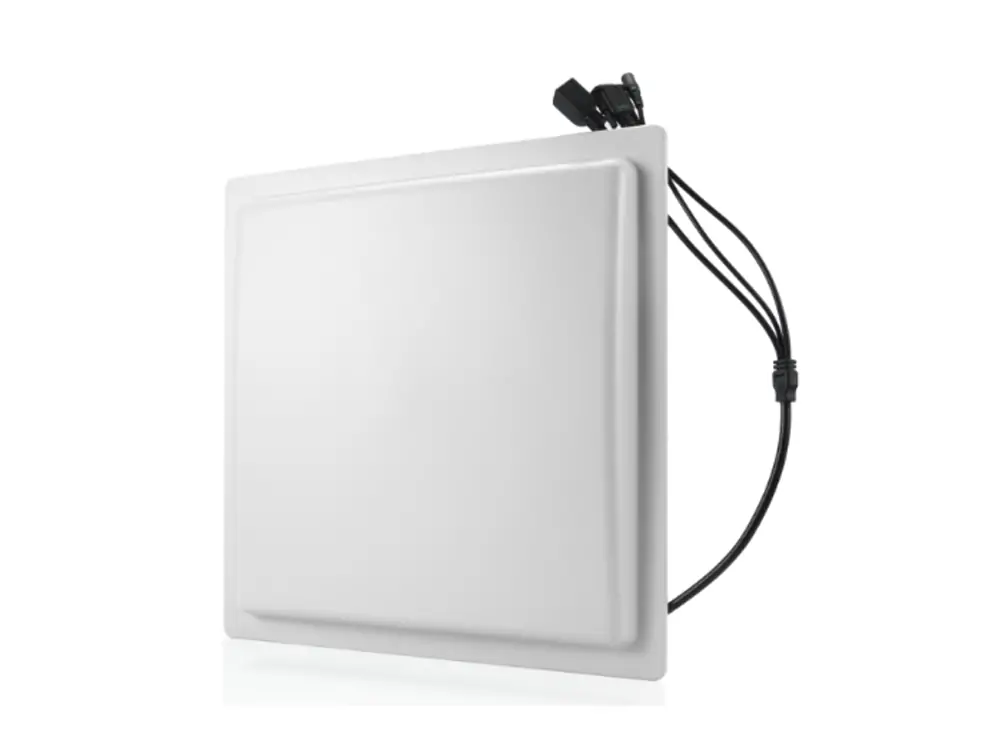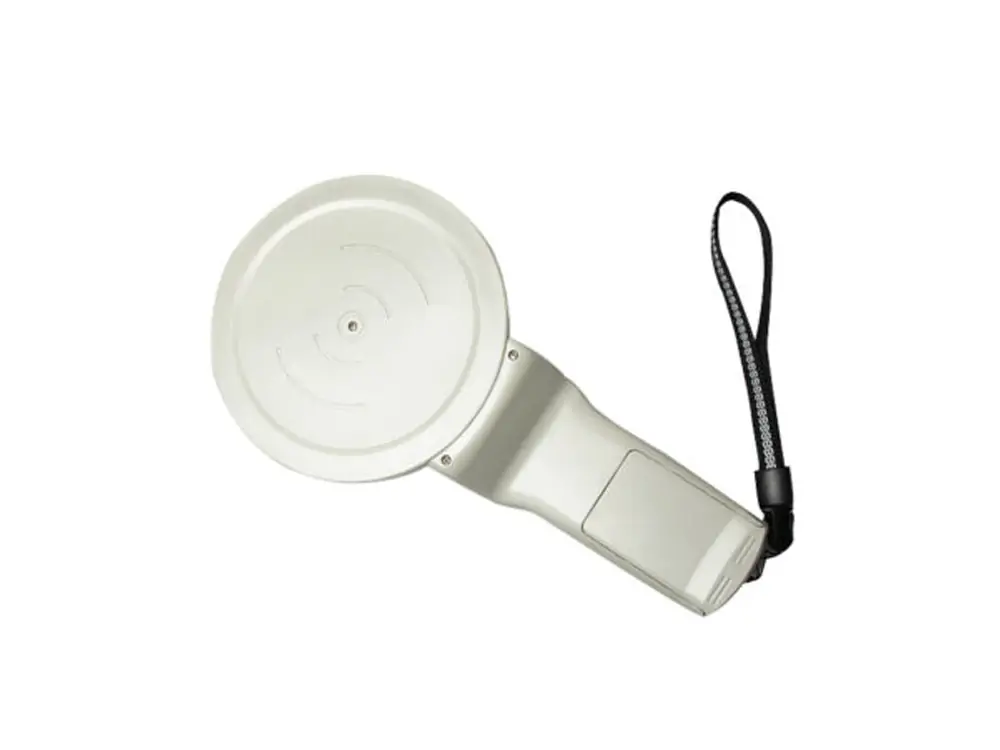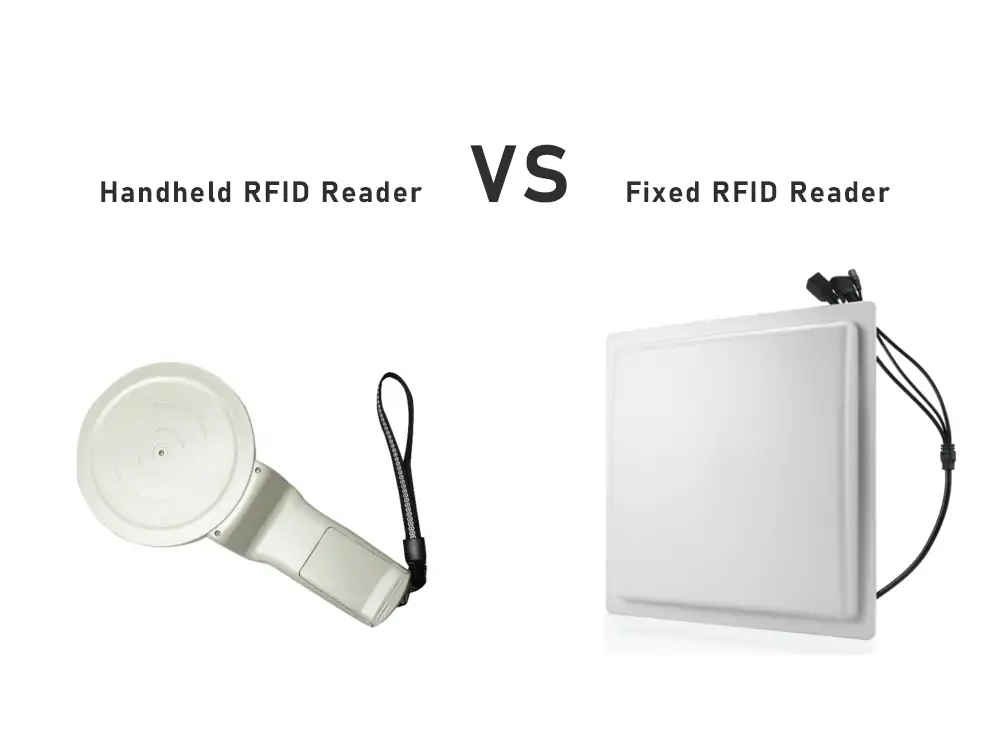A tecnologia de identificação por radiofrequência (RFID) revoluciona a gestão das explorações agrícolas. Os agricultores podem seguir o gado, as mercadorias e o equipamento em tempo real. O sistema RFID correto facilita a tomada de decisões informadas. A escolha do leitor RFID correto é crucial para uma gestão agrícola eficaz. Duas alternativas principais são os leitores RFID fixos e os leitores RFID portáteis. Dependendo das necessidades da sua exploração, cada um tem as suas vantagens e desvantagens.
O que são leitores RFID?
Um leitor RFID é um dispositivo eletrónico que lê as informações contidas numa etiqueta RFID. Em geral, um leitor RFID recebe as informações armazenadas na etiqueta. Em seguida, envia todas as informações para um sistema informático para processamento.
Estes leitores RFID servem as indústrias de retalho, logística, cuidados de saúde e fabrico. São particularmente úteis para a gestão de inventários, rastreio de activos e controlo de acessos.
Leitores RFID fixos: O que são?

Leitores fixos são montados em locais específicos. Recolhem automaticamente os dados das etiquetas RFID quando estas passam dentro do alcance dos leitores instalados. Em contraste com os leitores portáteis, os leitores RFID fixos são montados permanentemente. Geralmente são montados perto de pontos de entrada e saída, correias transportadoras ou qualquer outra área vital das instalações.
Os leitores fixos oferecem excelentes soluções para ambientes com grandes volumes de artigos. Localizam eficazmente os bens com um mínimo de intervenção humana. Podem cobrir grandes áreas, proporcionando um funcionamento contínuo, o que os torna adequados para zonas de elevado tráfego. Os leitores fixos também garantem que todas as etiquetas que passam por eles têm a sua informação lida.
Prós:
- São capazes de cobrir grandes áreas, assegurando assim a leitura de todas as etiquetas que passam no seu raio de ação.
- Funciona continuamente, o que é muito útil em ambientes de grande volume.
- Integra-se facilmente com outros sistemas automatizados para captar e processar dados.
- Taxas de precisão mais elevadas na leitura de etiquetas reduzem a possibilidade de leituras falhadas.
Contras:
- É mais dispendioso à partida, uma vez que são necessárias instalações, cablagem e criação de infra-estruturas.
- Sendo fixos, não podem ser facilmente transferidos para novos locais se as necessidades operacionais mudarem.
- Pode sofrer interferências de outros dispositivos electrónicos ou objectos metálicos, o que provoca variações de desempenho.
- Requer manutenção frequente para atingir um desempenho ótimo, especialmente em ambientes agressivos.
Leitores RFID portáteis: O que são?

Os leitores RFID de mão são dispositivos portáteis. Foram concebidos para ler e comunicar com etiquetas RFID a partir de diferentes locais. Ao contrário dos leitores fixos, os leitores de mão são portáteis e flexíveis, oferecendo mobilidade ao utilizador. Esta mobilidade permite que os utilizadores mudem de posição e leiam as etiquetas onde quer que estejam.
Os leitores RFID portáteis são excelentes para executar auditorias de inventário, verificar bens e realizar trabalho de campo. Os utilizadores podem transportar facilmente este dispositivo e deslocar-se manualmente, digitalizando itens para garantir que as etiquetas próximas estão cobertas. Esta caraterística também aumenta a sua eficácia para verificações pontuais e digitalização em movimento. No entanto, estes dispositivos precisam de ser recarregados com frequência, especialmente durante uma utilização prolongada.
Prós:
- São altamente móveis, o que é útil para se deslocarem e digitalizarem etiquetas de um sítio para outro. Isto torna-os adequados para utilização durante o trabalho de campo e os controlos no local.
- Pode funcionar mesmo quando não é possível instalar um leitor fixo.
- Um leitor portátil terá um investimento inicial mais baixo do que um leitor fixo, uma vez que não requer uma instalação.
- Adequado para utilizações alargadas e gestão de inventário para rastreio e manutenção de activos.
Contras:
- Necessita de intervenção humana. Por conseguinte, é moroso e pode ser obscurecido por erros humanos.
- Na maioria dos casos, tem um alcance de leitura mais curto do que os leitores fixos anteriores; por conseguinte, torna-se menos conveniente para escalas de funcionamento maiores.
- Requer o recarregamento da bateria, especialmente para uma utilização contínua.
- Situações de funcionamento difíceis e propensas a interferências podem afetar a sua precisão.
Leitor RFID fixo VS portátil: Qual é o mais adequado para a sua exploração agrícola?

Mobilidade
Um leitor RFID portátil permite-lhe deslocá-lo, permitindo-lhe transportá-lo para várias áreas da sua exploração agrícola. A mobilidade de um dispositivo portátil torna-o adequado para actividades enquanto o utilizador está em movimento. Isto é verdade quer o utilizador esteja a monitorizar animais no campo ou a digitalizar equipamento em armazém.
Por outro lado, um leitor fixo é estabelecido de forma permanente. Permite um controlo contínuo sem necessidade de intervenção humana.
Alcance e cobertura
Os scanners RFID fixos detectam muitas etiquetas a uma distância significativa e abrangem uma área maior. Isto torna-os ideais para a monitorização automática de grandes quantidades de bens ou animais.
Em contrapartida, um leitor de mão tem um alcance limitado. O utilizador tem de estar perto dos dispositivos RFID para obter uma leitura precisa. Por este motivo, os leitores de mão são mais adequados para tarefas específicas do que para o seguimento de toda a área.
Fonte de alimentação e duração da bateria
Outra consideração importante é a fonte de alimentação. Normalmente associado a uma fonte de alimentação contínua, um leitor RFID fixo garante um funcionamento 24 horas por dia, 7 dias por semana, sem perturbações. As tarefas que exigem uma supervisão regular dependem desta atividade contínua. Assim, um leitor RFID portátil funciona com pilhas, que têm de ser mudadas ou recarregadas regularmente. A duração da bateria varia consoante a utilização, o que pode ser um inconveniente para tarefas longas ou intensivas.
Durabilidade
Concebidos para serem robustos e resistentes, os leitores RFID portáteis podem sobreviver aos ambientes frequentemente adversos que se encontram nas explorações agrícolas. No entanto, a sua mobilidade aumenta a sua vulnerabilidade ao desgaste e à tensão ao longo do tempo.
Os leitores fixos são duráveis e estão protegidos dos impactos ambientais. A sua imobilidade também reduz o manuseamento físico, o que ajuda a prolongar a vida útil.
Escalabilidade
Em situações em que o âmbito do rastreio é restrito, um leitor RFID portátil é mais adequado para actividades classificadas como pequenas a médias. Expandir a sua utilização pode exigir muitos dispositivos, tornando a administração mais difícil.
Os leitores RFID fixos são facilmente expansíveis para quintas gigantes. À medida que mais leitores são adicionados à rede, esta pode cobrir vastas regiões.
Frequência da recolha de dados
Um leitor RFID manipulado pode recolher dados a pedido. Só digitaliza e regista informações quando é operado manualmente. Isto ajuda nas inspecções periódicas e na recolha de dados e é útil em intervalos pré-determinados.
Os leitores fixos oferecem uma recolha de dados contínua. Capturam automaticamente informações quando as etiquetas estão ao alcance. Isto garante actualizações em tempo real e monitorização contínua, o que é crucial para áreas com muito tráfego. Também suporta eficazmente procedimentos automatizados.
Requisitos para a instalação
Uma das vantagens de um leitor portátil RFID é o facto de não necessitar de instalação. É simples e está pronto a utilizar imediatamente após a abertura, o que o torna ideal para necessidades temporárias. Os leitores fixos requerem a instalação de hardware em locais específicos.
Além disso, a instalação deste hardware requer a perícia de um técnico. Mas, uma vez instalado, fornece uma solução mais permanente para a monitorização contínua.
Facilidade de utilização
Os leitores portáteis são fáceis de utilizar e de operar. Possuem interfaces intuitivas para que as pessoas os possam utilizar mesmo com conhecimentos técnicos mínimos. Estes leitores foram concebidos para serem utilizados no terreno com o mínimo de complicações.
Oferecem capacidades avançadas aos utilizadores. Os leitores RFID fixos podem exigir uma configuração e manutenção complexas. O seu funcionamento é automatizado para maior comodidade. A configuração correta é essencial para a sua utilização.
Conclusão
A decisão entre um leitor RFID portátil e um leitor fixo é um fator crítico na gestão agrícola. Cada leitor RFID tem as suas vantagens, dependendo das necessidades específicas da sua exploração agrícola. Os leitores RFID fixos são ideais para a monitorização automatizada e em grande escala. Eles garantem uma cobertura consistente em áreas críticas da fazenda.
Os leitores portáteis oferecem mobilidade e adaptabilidade. São ideais para inspecções no local e tarefas personalizadas. Compreender as capacidades únicas de cada leitor ajuda-o a tomar decisões informadas. Isto irá melhorar a eficiência e a produtividade da sua exploração agrícola. A tecnologia RFID é um ativo valioso para a agricultura.
